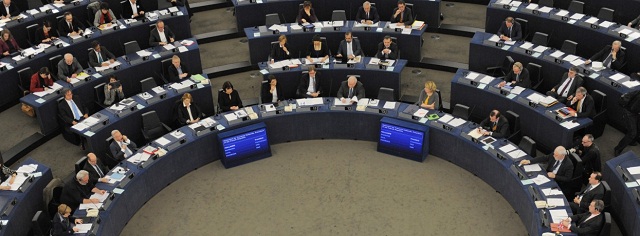Political agreement among the heads of state or government is not the end of the story concerning the EU long term budget.
The blog posts MAD MFF – Euroblogs on budget EUCO and Seven years in bleak houseshow that the national political leaders gathered in the European Council 7-8 February 2013 stubbornly pursued more limited priorities than Martin Schulz, who spoke as the president of the directly elected European Parliament (EP).
The European Parliament has communicated its priorities for the long term budget 2014-2020 well in advance (feature page with links).
Unsurprisingly the leaders of the main political groups in the European Parliament, Joseph Daul, on behalf of the EPP Group, Hannes Swoboda, on behalf of the S&D Group, and Guy Verhofstadt, on behalf of the ALDE Group and on behalf of the Greens/EFA Group Rebecca Harms and Daniel Cohn-Bendit, issued a joint statement rejecting the EUCO agreement on the multiannual financial framework (MFF) 2014-2020 as weakening European competitiveness, instead of strengthening it.
Besides contesting a long term budget leading to a structural deficit, the group leaders presented a common front on four points.
First, we are calling for increased flexibility using Qualified Majority Voting : between years and between categories of spending. It is a sensible approach which will allow us to make the best use of our financial resources.
Second, we are also standing firm on a compulsory revision clause with a Qualified Majority Vote in the Council, which should allow us to revise the financial framework in two or three years. We don’t accept an austerity budget for seven years.
Third, with this same sense of responsibility we are calling for new, genuine own resources for the European budget to progressively replace the current system based heavily on national GNI contributions.
Fourth, we cannot accept a budget based solely on priorities of the past. We must maintain support for future-oriented policies, strengthening European competitiveness and research.
Political agreement among the heads of state or government is not the end of the story. According to Article 312(2) Treaty on the Functioning of the European Union (TFEU), the Council needs the consent of at least 378 MEPs (a majority of the 754 members):
“The Council, acting in accordance with a special legislative procedure, shall adopt a regulation laying down the multiannual financial framework. The Council shall act unanimously after obtaining the consent of the European Parliament, which shall be given by a majority of its component members. The European Council may, unanimously, adopt a decision authorising the Council to act by a qualified majority when adopting the regulation referred to in the first sub-paragraph.”
It remains to be seen what European Council is going to give procedurally or substantially, and how the European Parliament is going to vote in the end. Hopefully both competitiveness and democracy advance.
Am I all for the Commission proposal(s) or the European Parliament’s initial position? Although both would have allocated more to the future of Europe, neither proposed a reformed budget for security and competitiveness, which would have made a clean break with legacy spending.






Be the first to comment on "What’s next for the EU budget"